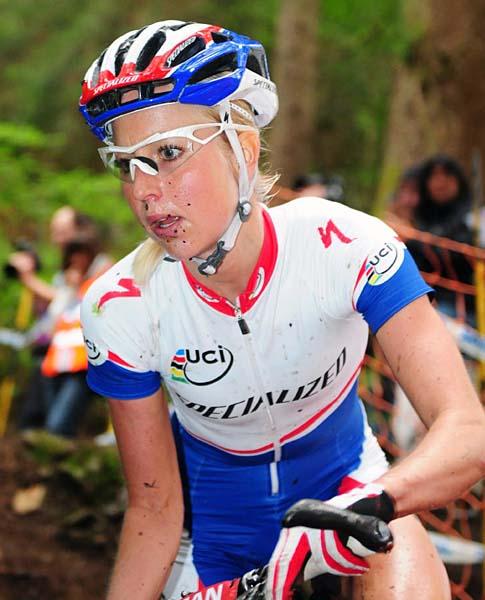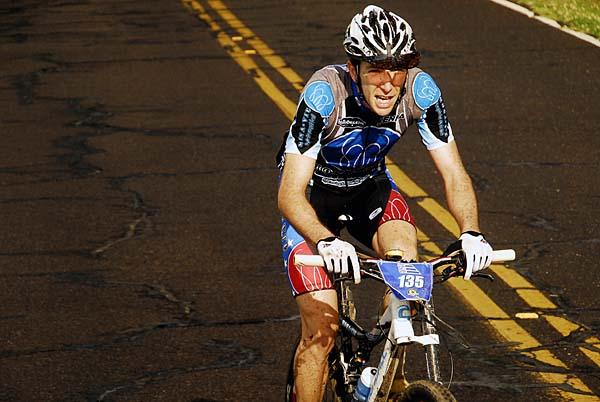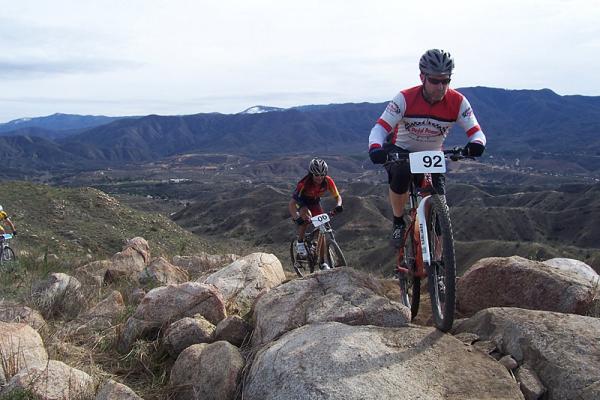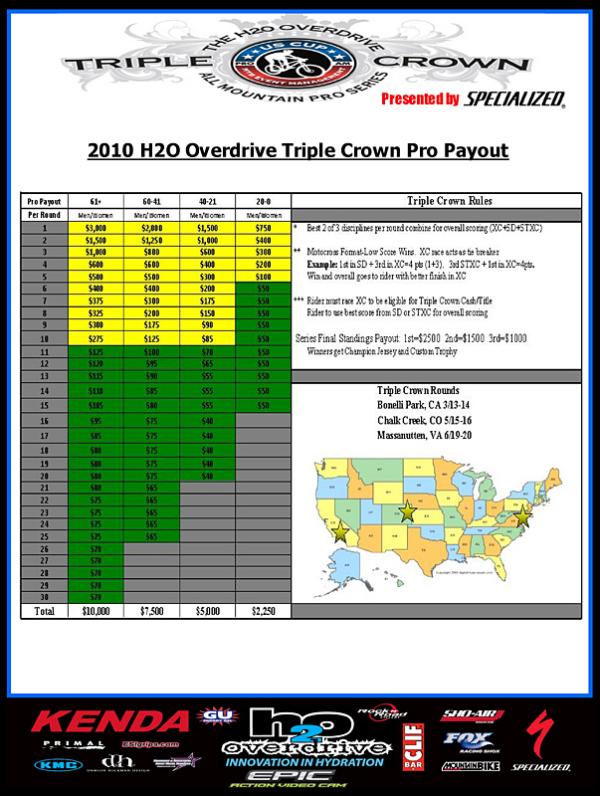Inaugural Triple Crown means more racing, prizes for pros
New mountain bike series augments American calendar




The US mountain bike calendar of elite cross country racing has undergone several major changes during the off-season. In this part two of our feature series on the two US national cross country series, Cyclingnews spoke to Ty Kady about the All Mountain Triple Crown, a new three-round series for 2010. In part I, Cyclingnews reported on the second-year US Pro Cross Country Tour (US Pro XCT).
It wasn't long after the US Cup withdrew from its US Pro XCT organizing role until racers learned of a new national-calibre series. The US Cup assembled a three-race Triple Crown series with rounds in California, Colorado and Virginia for 2010. Each weekend-long round will feature a cross country, a short track and a super D.
"The Triple Crown came out of our decision not to manage the US Pro XCT," said US Cup Spokesperson Ty Kady. "When we stepped out of the management of the Pro XCT, that opened up a few things - including the additional funding that we would have put toward the Pro XCT - and we had some extra time on our hands to manage some events."
Instead of managing five or six US Pro XCT events, the US Cup will run three Triple Crown races and one US Pro XCT round - the opener in Fontana. The first Triple Crown event will happen the weekend of March 13-14 in Bonelli Park, California. Round two will move to the Chalk Creek Stampede in Nathrop, Colorado, over the weekend of May 15-16, and then the series will conclude at the Massanutten Hoo Ha! near Harrisonburg, Virginia, on June 19-20.
"We will have more control over the Triple Crown events, and the series is a concept for which we want to see if it can get some traction over the next three to five years."
The series is focused on top riders and privateers. "The [race] calendars are already diluted enough with the various series. We were deliberate in not conflicting with US Pro XCT or the World Cups," said Kady. "As soon as you start dividing the calendar and choosing between UCI events in the States or the World Cups and us, the riders will have to go to those other races to meet their goals. It's in our best interest not to conflict.
How the events were chosen
Get The Leadout Newsletter
The latest race content, interviews, features, reviews and expert buying guides, direct to your inbox!
"We wanted to hit the West Coast, Rocky Mountains and also represent the Mid-Atlantic East Coast," said Kady.
The Bonelli Park venue was an obvious candidate for the Triple Crown after it was no longer to be part of the US Pro XCT. The other venues came about based on what Kady and his crew "could make work on short notice. When Bonelli was denied UCI status, we knew we were still going there. We put a lot of time in that event. It's a great opener."
Speaking of the Colorado venue, Kady said, "The folks at the Mountain States Cup were receptive to open up one of their rounds."
As for the Virginia race, it was part of the US Kenda Cup last year, so organizers of the Hoo Ha! and the US Cup already had an established relationship.
The format
"The big difference [between the US Pro XCT and the Triple Crown] is that the Triple Crown is not just about cross country," said Kady. "That's why we've been using the term 'All Mountain'. Doing well will require more all-around bike handling skills for these athletes."
Each Triple Crown will include one each of a cross country, a super D and a short track race. Riders will have to compete in the cross country and either the super D or the short track race each weekend.
"We are placing more emphasis on cross country because we still want our riders to come to this event and work on their cross country skills like fitness and speed," said Kady. "We added a little gravity element with the super D."
"A rider will use his cross country score plus one other. Let's say that he flats in the super D, then he can use his short track instead. The tie breaker will be the cross country results."
Cross country course formats will vary by venue. Bonelli Park will offer a prototypical European World Cup type of lap - about four to six miles in length. The Massanutten Hoo Ha! will stick closer to its longer, traditional nine-mile lap, and the Chalk Creek Stampede course is expected to be a shorter lap format - more like that of Bonelli Park.
In its first year, the Triple Crown will include short track and super D scoring only for the pros.
"For this year, due to the late notice, we will, of course, let amateurs race all three events, but we will not be tracking points or awarding series championships to any amateur classes for 2010. We want to build on it in years to come."
There will be no limitations on what bikes a rider can use and riders will not be required to use one bike for all disciplines. If a rider wants to use a six-inch full suspension bike for super D, hop on a hardtail for the short track, and use a lightweight full suspension for the cross country, no problem. Using the same bike for all disciplines is also ok.
"We hope it encourages a cross over of teams and equipment to be displayed at the Triple Crown Races. Riders may also change out tires and components accordingly to the events as they see fit," said a guide to the series put out by the US Cup.
Bring on the cash
It's no secret that most mountain bike pros aren't rich. Many race without salaries, relying on the monetary support of family or friends, prize winnings or bonuses from sponsors for top results. The US Cup is hoping the Triple Crown will be a way to help established and up-and-coming pros earn more money.
When the US Cup walked away from organizing all the US Pro XCT races, the requirement to hold UCI races disappeared. After looking at the costs associated with UCI sanctioning, the US Cup decided it would rather spend the money on prizes instead.
"We feel that offering prize money with up to $3,000 for a win - if certain field limits are met - is a way to separate our races from the rest because it means more money up for grabs for top pros."
"I think you will get a lot of appreciation from the riders for the payouts," said Canadian cross country pro Geoff Kabush, a long time regular top performer in various national series over the years. "That is about how it was back in the day when I started: $3,500 for the win... It is nice when you can finish fifth or sixth and still get 500-600 bucks to break even for the weekend."
Kady is interested in supporting the emerging pros, too. They often toil in anonymity, earning almost nothing until they have a breakthrough race and hit the top few places.
"Where the UCI stops paying at five spots for a C3-category race or 15 sports for C1-category race, we will pay down to 30 places. We'll also give more for the win. We want to reach the privateer pros and help them in their efforts."
Measuring success and going forward
Kady says that what would make the inaugural Triple Crown a success would be good media coverage and attendance by several top pros.
Thus far, 2009 women's World Championship bronze medalist Lene Byberg, Todd Wells, Jeremiah Bishop, Tinker Juarez, Sid Taberlay, Max Plaxton and Tad Elliot have confirmed attendance at some Triple Crown events. Geoff Kabush may also make an appearance.
"It'll also be a success if the privateers come out and grasp onto this and try to put a few bucks in their pockets. While we know all the top pros can't make it, I'd be just as happy to see our local pro fields grow."
Speaking specifically of Bonelli Park, which saw 34 pros in 2009, Kady said, "We're hoping for big to modest gains. We hope to take Bonelli up to 60 pros as we are looking for generally increased participation."
Kady does not see UCI points in the Triple Crown's future. "I don't think we'll ever go after UCI points for the Triple Crown events. We had that opportunity with the US Pro XCT. Part of the birth of the Triple Crown was taking what we felt where dollars allocated to doping or officials or inscriptions and wasn't getting to rider pockets and instead offering more prize money. The UCI Pro XCT calendar looks complete, so athletes seeking UCI points have enough venues to chase their Olympic goals.
"With our focus on the mid-level pro, UCI points aren't as important," said Kady. "We can do our own call ups and scoring without UCI categorization. When you are UCI categorized, UCI points take precedence and determine call-ups. The UCI is focusing on the Olympics and World Cup starts and that doesn't integrate with what we're trying to accomplish."
The US Cup is open to other venue possibilities. "For example," said Kady, "with this being an all mountain event, we may look for other venues in California that offer more technical riding to make the super D more legitimate and bring up its level to that of our cross country course."
For 2010, Kady and his team are trying out a regional Triple Crown that could roll out to other parts of the country in future years. "We will run a beta test of a regional Triple Crown in the west. What we've found, especially in this economy, is that amateurs tend to stay regional." The west coast Triple Crown will include Ellings Park, Santa Ynez and Bonelli.
Whether the Triple Crown will ever include more gravity-specific events doesn't look likely any time in the near future. "Gravity racers are specific as to what they consider a real gravity course. We'd love to incorporate gravity, but we're not willing to force it or do it half-ass," said Kady. "For us, venues are a big thing. Gravity is a different market with different needs - like chair lifts and shuttle services. It's more labor intensive for the promoter to run. We're not there yet."
Consistency is key
With significant changes in organization to the various national series over the past three years, what may prove most valuable to the long-term viability of any series is consistency.
"It's important for us to develop consistency. Mountain biking is about history, community, etc. We want this thing to stick. We need to deliver for the riders and the sponsors," said Kady.
"I'm feeling good about the series, and I hope we're on the right path," said Kady. "We're going to stick with this plan for the next three to five years. I talk about three to five years because it takes awhile for the industry and the public to latch on to a concept.
"If you're always bouncing around and changing the model year after year, it doesn't get enough traction. When you look at [established races like] Iceman Cometh and Sea Otter, the credibility is there. I want my sponsors to see tangible growth in increased attendance, prize money, media coverage or all of those."
Stay tuned to Cyclingnews for coverage of both the Triple Crown and the US Pro XCT events.
For more information on the series, visit www.uscup.net.
2010 Triple Crown All Mountain Series
March 13-14: Bonelli Park, California
May 15-16: Mountain States Cup at Chalk Creek, Colorado
June 19-20: Massanutten Hoo Ha!, Virginia
Sue George is an editor at Cyclingnews. She coordinates all of the site's mountain bike race coverage and assists with the road, 'cross and track coverage.